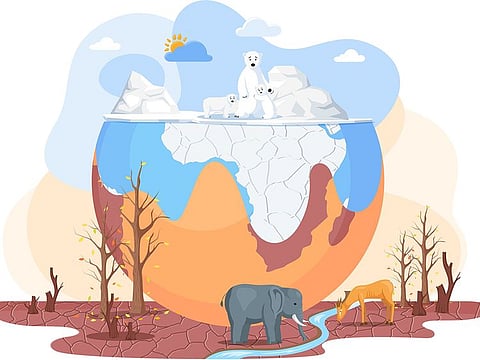Climate-induced disasters are displacing millions
Governments must create climate migration policies to protect communities from disasters

For millions of people worldwide, climate-induced disasters are ruinous, resulting in detrimental socioeconomic impacts as well as forced displacement of local communities.
Climate migration happens when natural disasters and environmental changes make certain areas unlivable, forcing local communities to relocate within the same country or across borders in search of safer, more sustainable living conditions.
While most climate-related displacement happens within a country, and affected individuals might eventually return home, the intensifying and unpredictable effects of climate change are increasingly making some regions permanently uninhabitable.
Climate migrants face numerous challenges as they undertake the difficult process of migration. Gaps in legislation can leave climate refugees vulnerable to abuse, discrimination, exploitation, forced labour, and trafficking.
At present, the 1951 Refugee Convention covers only those who face persecution based on race, religion, nationality, membership in a specific social group, or political opinion. It does not address climate-related risks as a basis for refugee status.
A critical challenge
Climate migrants also experience significant infringements on their basic human rights, such as limited access to essential resources like food, water, sanitation, housing, health care, and education.
The unplanned and urgent need to relocate results in the loss of employment and difficulty finding stable opportunities elsewhere, adversely affecting the livelihoods and physical well-being of individuals. The severance of social networks and community ties can also negatively impact mental well-being levels of affected communities, with feelings of isolation, anxiety, and depression imploding.
With extreme weather events becoming ever more frequent and intense, climate migration is increasingly becoming a critical challenge that governments need to prepare for and manage.
According to alarming data published by the International Organisation for Migration, 46.9 million new internal displacements were recorded in 2023 and 56 per cent of them were caused by natural disasters. These disaster-induced displacements encompass both weather-related hazards (such as storms, floods, and wildfires) and geophysical hazards (such as earthquakes, volcanoes, and tsunamis).
Friontline of climate hazards
Many communities are already on the frontline of climate hazards and are facing substantial detrimental social and economic impacts. On 20 September 2017, Hurricane Maria struck Puerto Rico, wreaking havoc on homes and infrastructure, in addition to forcing the displacement of at least 130,000 residents, or nearly 5 per cent of the island’s population.
On the other hand, UNHCR data reveals that between 2016 and 2020, 72 per cent of new displacements in Somalia were caused by droughts or floods. Conversely, the various climate-induced disasters in Peru have displaced 879,000 people between 2008 and 2023, according to data published by the Internal Displacement Monitoring Centre.
Therefore, addressing the challenges of climate migration requires devising a robust resilience policy that prepares communities for uncertainties and helps them in rebuilding their lives post-disasters.
Evacuations and preparedness measures
Governments should design such policies in partnership with multi-agency stakeholders, communities, private sector enterprises, the civil society sectors in order to map out detailed action plans according to the various disaster scenarios that could take place.
In the short term, governments should set up data centres to monitor climate events, provide early warnings, and coordinate timely evacuations and preparedness measures.
Social protection programs are critical levers for supporting vulnerable populations during these stressful times, while community awareness initiatives can educate locals about climate risks and practical measures to undertake in the event of a disaster.
Additionally, implementing skills development programs will be crucial for helping individuals adapt, recover, and rebuild their livelihoods and communities after a disaster.
Governments, humanitarian agencies, and communities should work together on planned relocation efforts, moving populations from areas severely affected by climate change to safer and more resilient locations. On this regard, international stakeholders would also need to establish clear migration management plans to ensure migration is safe, orderly, and dignified.
Volatility of climate hazards
Introducing legal frameworks to recognise and protect climate migrants is crucial for ensuring their rights and security. This involves establishing clear criteria for granting refugee status or temporary or permanent residency options specifically for individuals displaced by climate-related disasters.
Long-term climate policies should aim for a sustainable and resilient future by focusing on adaptation plans and environmental conservation. For instance, investing in climate-resilient infrastructure and housing in vulnerable areas is an imperative step in reducing the need for relocation of residents.
Policies should also include investments in innovative climate resilience projects and agri-technologies to enhance agricultural productivity whilst withstanding the effects of climate hazards. Additionally, implementing sustainable water resource management practices will promote water conservation in already water-stressed regions, improve access to clean water, and mitigate the impacts of droughts and floods.
When disasters do hit the ground, it is essential that dedicated funds are available to expedite the rebuilding projects of affected areas, thus reducing the need for displacement for very long periods. Financing from the government, multilateral development banks, and the private sector could supplement such funds and ensure swift responses to climate hazards.
Considering the volatility of climate hazards, it is pivotal that governments craft effective climate migration policies to safeguard communities battling with the ravages of climate-induced disasters.
Sara Al-Mulla is an Emirati civil servant with an interest in human development policy and literature



